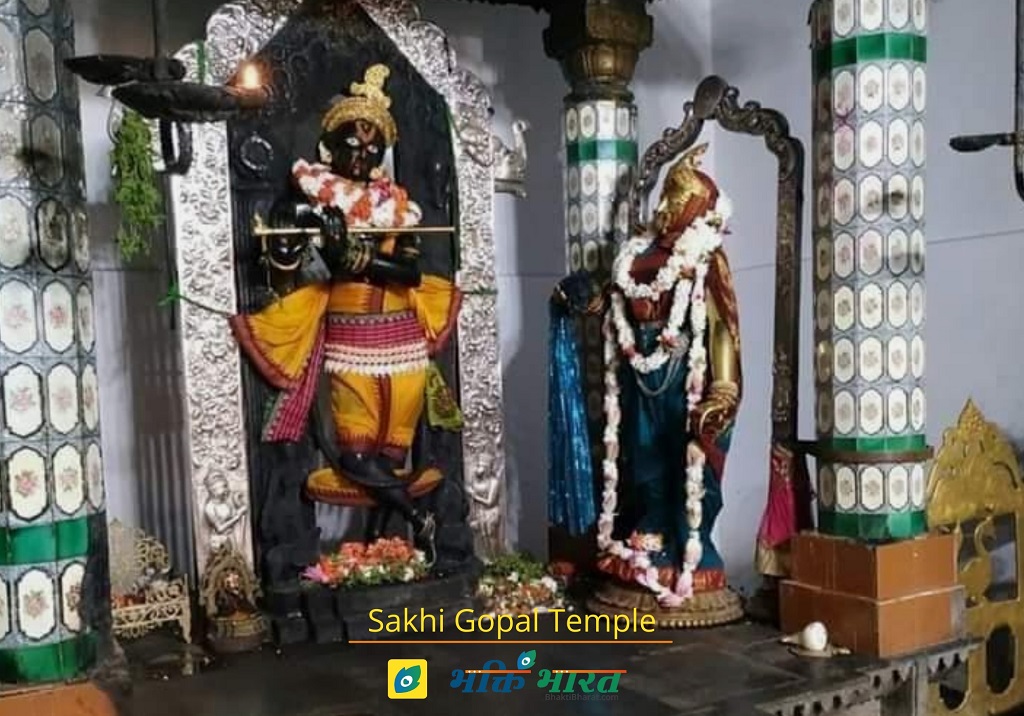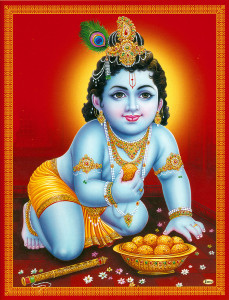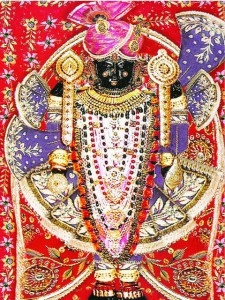The Journey of Two Brahmins
Once there were two Brahmins from Vidyanagara in South India who decided to embark on a pilgrimage to various holy places in Northern India. After a long journey, they reached Vrindavana, the sacred land of Lord Krishna’s pastimes. They bathed in the holy Yamuna River, visited Govardhana Hill, and explored the twelve forests of Vrindavana. Eventually, they arrived at a grand temple where the Gopala Deity, a form of Lord Krishna as a cowherd boy, was worshipped. The beauty of the Gopala Deity captivated their hearts, and they decided to stay for a few days.
A Noble Promise
Among the two, one was an elderly Brahmin from a high-class family, and the other was a young Brahmin from a low-class, poor background. The young man, out of respect and love, served the elderly Brahmin with great devotion, ensuring that he was comfortable despite the challenges of travel. The elderly Brahmin was so touched by this service—something he had not even received from his own family—that he decided to offer his daughter in marriage to the young Brahmin. The young man, however, was hesitant and tried to decline, pointing out the disparity in their social and economic statuses. He also feared the objections of the elderly Brahmin’s family. Despite this, the elderly Brahmin insisted, saying, “I will give my daughter to you, regardless of what others think.”
A Sacred Vow Before Gopala
To solidify the promise, the young Brahmin suggested that they make the vow in front of the Gopala Deity. In those days, promises made before a Deity were considered sacred and unbreakable. So, they went to the temple, and the elderly Brahmin declared in front of Lord Gopala, “My dear Lord, please witness that I have given my daughter to this boy.” The young Brahmin also addressed the Deity, saying, “My dear Lord, You are my witness. I shall call upon You to testify if needed.”
The Return to Vidyanagara
Weeks later, the two Brahmins returned to Vidyanagara and went to their respective homes. After some time, the elderly Brahmin, remembering his promise, informed his family about the marriage agreement. His relatives were outraged. They mocked him and threatened to sever all ties if he followed through with the promise. His wife and sons even threatened to commit suicide. The elderly Brahmin, torn between his promise and his family’s objections, expressed his dilemma. His son, thinking pragmatically, suggested, “The Deity may be a witness, but He is far away in Vrindavana. Simply say you don’t remember making the promise, and I will handle the rest.”
The Young Brahmin’s Desperation
When the young Brahmin came to claim his bride, the elderly Brahmin’s son chased him away with a stick. The young Brahmin then gathered the village elders, explaining that the elderly Brahmin had promised his daughter to him before the Gopala Deity. The elderly Brahmin, under pressure from his son, denied any recollection of the promise. The son accused the young Brahmin of trying to exploit his father for money, claiming that the young man had poisoned his father during their pilgrimage. The village elders, unsure whom to believe, were divided.
A Plea to Lord Gopala
In desperation, the young Brahmin insisted that the elderly Brahmin had made the promise in front of Lord Gopala, who could testify to the truth. The elderly Brahmin, still hopeful, said, “If Gopala personally comes here to bear witness, I shall surely give my daughter to the young Brahmin.” His son, confident that this was impossible, agreed to the condition.
The Miracle of Gopala
With unwavering faith in Gopala, the young Brahmin returned to Vrindavana. Upon arriving at the temple, he narrated the entire situation to the Deity, saying, “My dear Lord, I am not seeking happiness from this marriage. I am simply pained that a Brahmin has broken his promise. You know everything, and I implore You to bear witness in this case.” To the young Brahmin’s surprise, Lord Krishna spoke from the Deity, “I’ve never heard of a Deity walking from one place to another!” The Brahmin replied, “That may be true, but You are speaking to me now, even though You are a Deity. You are not just a statue; You are the Supreme Personality of Godhead, Lord Krishna Himself!”
Lord Gopala smiled and agreed to accompany the young Brahmin. “I will walk behind you,” Gopala instructed. “Do not turn around to see Me. As soon as you see Me, I shall remain stationary. You will know that I am following you by the sound of My ankle bells. Cook one kilo of rice daily and offer it to Me. I shall eat that rice and follow you.”
The Witness Arrives
The next day, the Brahmin set out for Vidyanagara, and Gopala followed him, step by step. The Brahmin was overjoyed to hear the tinkling sound of Gopala’s ankle bells as they traveled. Every day, he cooked rice for Gopala and offered it to Him. After a long journey, they finally reached the outskirts of Vidyanagara. The Brahmin, eager to inform the townspeople of Gopala’s arrival, momentarily forgot the Deity’s instruction and turned around. There, he saw Lord Gopala standing, smiling. The Lord said, “Now you can go home. I will stay here and not move.”
The Revelation
News of Gopala’s arrival spread quickly, and the entire village came to see the miraculous Deity. The townspeople, struck with wonder, offered their obeisances to Lord Gopala. In front of everyone, Lord Gopala confirmed the elderly Brahmin’s promise, and the marriage between the young Brahmin and the elderly Brahmin’s daughter was solemnized.
A Temple for Gopala
The King of the region, upon hearing this incredible story, came to see Gopala himself and ordered the construction of a grand temple for the Lord. Although the Deity of Lord Gopala was later moved from Vidyanagara to Cuttack in Orissa, He is still worshipped today and is famously known as Sakshi-Gopala, the Witness Gopala. The temple is now located near Jagannath Puri, where devotees continue to marvel at this miraculous account of divine intervention and faith.
Lessons to be Learned
- Faith in God: The young Brahmin’s unwavering faith in Lord Gopala demonstrates that sincere devotion and trust in the divine can move mountains and bring about miraculous events.
- The Power of a Promise: A promise made before the Lord is sacred and must be upheld, regardless of the difficulties and opposition one may face.
- Divine Justice: The story illustrates that God is the ultimate witness and judge, and He will intervene to uphold truth and justice when necessary.
- Simplicity of Devotion: Lord Gopala’s willingness to accompany the young Brahmin shows that God is accessible to everyone, regardless of their social status, as long as their devotion is sincere.
Prayer to Lord Gopala
O Lord Gopala, witness of all that is true and just,
You who walked behind Your devotee to uphold the truth,
Grant me the faith to trust in Your divine justice,
And the courage to stand by my promises, no matter the opposition.
Let my heart be filled with unwavering devotion,
So that I may always feel Your presence guiding me.
May I remember that You are the ultimate witness,
And live my life in accordance with truth and righteousness.
O Sakshi-Gopala, may Your divine grace be my constant companion,
Guiding me on the path of dharma and devotion.
I surrender at Your feet, O Lord,
Please be the witness to my sincere efforts and bless me with Your mercy.
Quote from Shastra
“satyaṁ śaraṇaṁ gaccha satyaṁ hi paramā gatiḥ
satyaṁ hi yātaḥ sa gataḥ satyaṁ gacchati santatam”
Translation:
“Take refuge in the truth, for truth is the supreme destination. Those who follow the path of truth will attain the highest goal.”
— Mahabharata, Shanti Parva 162.18
This verse emphasizes the importance of truth as the ultimate path to liberation and divine grace, resonating deeply with the story of Sakshi-Gopala.
4o



